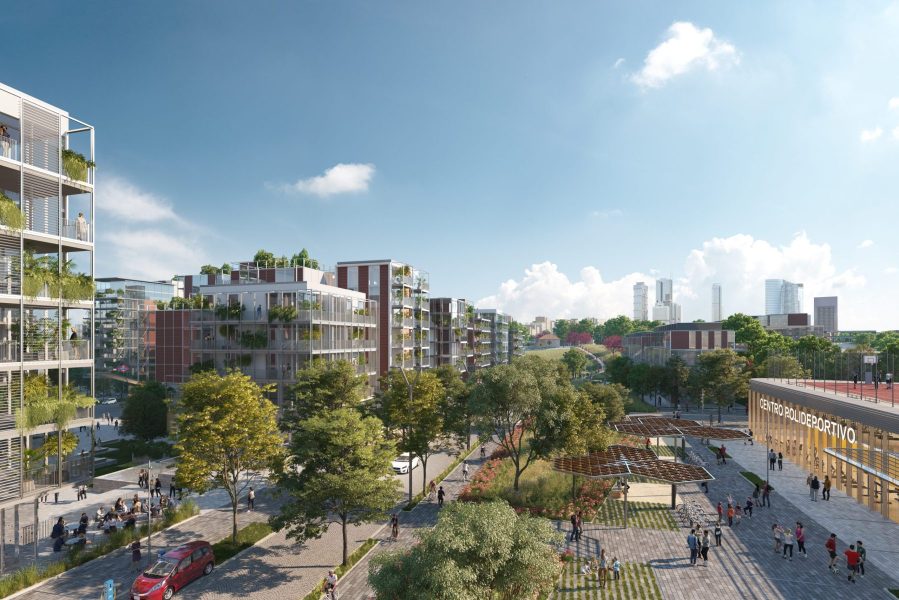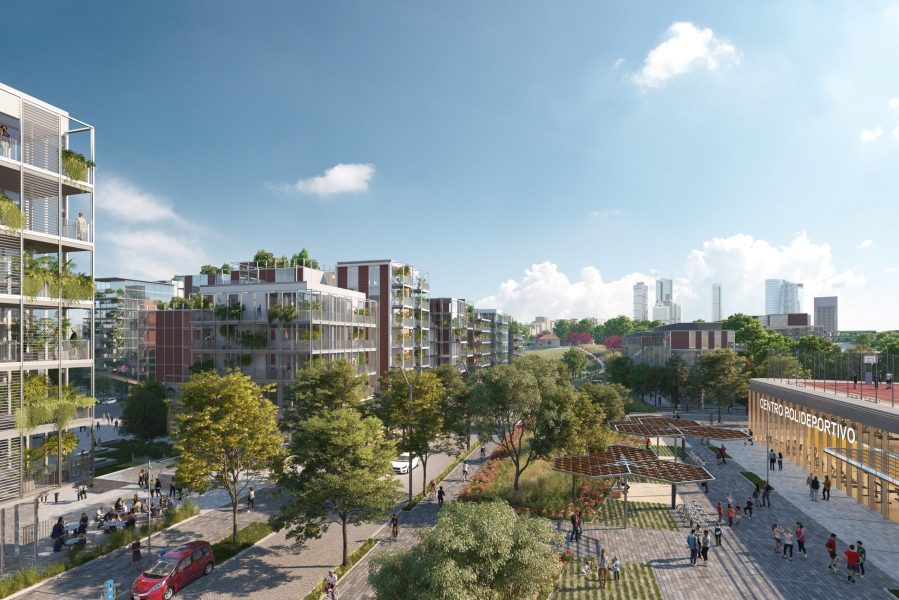19 June 2020
for Madrid Nuevo Norte

Jorge Serrano, DCN’s technical manager, examines the recipes for a relatable city at the one-day event organised by the Civil Engineers of Madrid

The importance of designing and building safe, liveable cities has become even more evident during the health crisis due to the COVID-19 pandemic. For this reason, Madrid’s Professional Association of Civil Engineers organised the one-day event “Relatable Engineering “ to analyse the different ways in which engineers can contribute to this challenge.
In this context, Jorge Serrano, the technical manager of Distrito Castellana Norte’s (DCN) Business Area, analysed the ingredients needed to build the relatable and resilient city that society demands. Firstly, Serrano stressed the importance of mixed uses to bring life to neighbourhoods all day, every week, improving the quality of life for citizens and facilitating the integration of housing into the same environment as work, retail and leisure activities.
DCN’s manager insisted, “The city must encourage social relations. It is therefore essential for the public space to be functional and liveable, and that the public and private facilities provide excellent services to meet the needs of residents and users”.
The round-table participants also reflected on urban mobility. Serrano drew attention to the importance of public transport infrastructures and the need to further deepen the trend of reducing polluting transport. He stated, “COVID-19 should not push us to use the car as a priority means of commute as it would be environmentally unsustainable”, as all panellists agreed.
“In addition to public transport, it is also essential to encourage pedestrian and cyclist mobility”, said the DCN manager, who emphasised the relevance these elements have in Madrid Nuevo Norte. Meanwhile, Alfonso Vegara from Fundación Metropoli stated that owing to its climate and layout, Madrid could be a global benchmark for active mobility, especially within the area inside the M30, a ring road that, in his opinion, “needs to be rethought to become a large boulevard”.
David Solla, representing the association Madrid Capital Mundial de la Ingeniería, Construcción y Arquitectura, highlighted how the boom in teleworking, driven by the health emergency, will help reduce the need to travel. Solla estimates that 80,000 daily commutes would be eliminated with just 10% of people teleworking in the Community of Madrid. In this sense, Serrano emphasised that telework could reduce peak-hour congestions. Still, it would not reduce demand for mobility in the future, as data show that non-work-related mobility “already accounts for 60% of commutes in the Community of Madrid”. That is why he insisted, “public transport will continue to be essential for the city of the future”.
Without a doubt, combating climate change is another ingredient that experts consider essential to “cook” the city of the future. Serrano emphasised that sustainability is a core element of Madrid Nuevo Norte, “that wants to be at the forefront of solutions to reduce the polluting impact of cities, promote energy savings and safeguard natural resources”.
DCN’s representative explained that sustainability is not only about the environment. “Nowadays, an urban development project will fail if you do not listen to citizens and do not explain the project well”, he summarised. Indeed, Serrano recalled how Madrid Nuevo Norte engaged in participatory processes, driven by both the administrations and the Company as the main leader of the Project.
The speakers also insisted on the need for urban planning regulations to provide greater flexibility to planners, because cities need to be able to adapt to changing circumstances, as the COVID-19 pandemic has demonstrated. The world needs resilient cities, and the ability to adapt to changes is key to being resilient.
The speakers agreed to leverage the many qualities Madrid has, both in terms of its geostrategic location (the gateway between Europe and Latin America and Africa) and its highly developed infrastructures. Solla explained that Madrid Capital Mundial de la Ingeniería, Construcción y Arquitectura was created to foster these qualities and make them known throughout the world. He also underlined that although there is more to be done and progress has to be made, we have a lot of which to be proud. “For instance, Madrid is far ahead of London in optic fibre,” he explained.
Vegara agrees on the importance of leveraging the city’s qualities, because in today’s world “countries do not compete; it is cities that compete. Madrid has to be a laboratory for urban transformation”.
Cities are competing not only to attract tourism or investments but also to train, retain and attract talent. To that end, Serrano advocated that the CBD that would be created in Madrid Nuevo Norte would be crucial. “The urban environment is the key to the true success of a project,” he explained because providing a worker-friendly environment is seen by the companies as increasingly important. Therefore, he concluded, “Madrid Nuevo Norte wholeheartedly embraces these principles of sustainable urban development”.